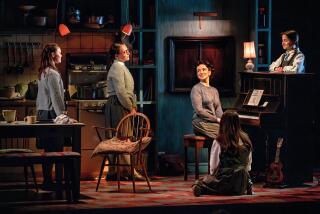BARSTOW IN TITLE ROLE : SAN DIEGO OPERA OFFERS A NOT SO MERRY ‘WIDOW’
SAN DIEGO — Most opera companies turn to Lehar’s “The Merry Widow” these days if and when they need a vehicle for a prima donna at twilight.
The nice old operetta isn’t often performed for its own merits. It is performed to showcase the diminishing but hopefully glamorous glories of a Sills or a Sutherland or, at the very least, an Evelyn Lear.
That’s the way it was in San Diego seven years ago when Tito Capobianco put on a tinselly “Merry Widow” show for and around everybody’s darling, Beverly Sills. In spite of the prima donna, this was a tasteless, busy, show-bizzy affair. Nevertheless, it found its way onto national television and into the repertory of the New York City Opera.
The San Diego “Widow” relied on quasi-Jugendstil window-dressing sets and Broadway-kitsch costumes by Carl Toms that lent new depths of meaning to such concepts as garish and tacky. It revived tired gags and silly routines that would have looked embarrassing even in the hoariest Civic Light Opera extravaganza. It enlisted a generally weak supporting cast and, perhaps worst of all, cranked out Lehar’s wonderful, sensuous, sentimental tunes as if they were just so much elevator Muzak.
Sunday night, San Diego revived its not-so-merry “Widow.” The decors, alas, were the same. But just about everything else was different. And better.
This time, the director was Robert Helpmann, a legendary figure in British ballet who staged the proceedings as if they really meant something--at least some of the time. He played the charades, wherever possible, as high comedy, not low farce, yet savored an old music-hall routine or two when a comic escapade was inevitable.
He also did what could be done with the ballet divertissements. Most important, he sustained a reasonable facsimile of elegance that made it possible for his principals to create credible, subtle, even sympathetic characters, the operettic never-never land milieu notwithstanding. He let his protagonists take themselves, and each other, seriously.
Helpmann was lucky, of course, to have as his protagonists Josephine Barstow and Jacque Trussel. Very lucky.
Unlike her most famous contemporaries as Hanna (a k a Anna) Glawari, Barstow is a lovely young woman in the prime of her career. She moves like a dancer and exudes sex appeal without seeming to try. She commands a pliant, shimmering lirico spinto soprano and knows how to make the words count--even in Christopher Hassall’s rather stilted translation.
She floated the potentially mawkish Viljalied Sunday as if it were an object lesson in the expressive possibilities of the Mozartean pianissimo. In the third act, she sang “Meine Lippen, sie kuessen so heiss” so voluptuously that the interpolation almost seemed justified.
Trussel found just the right, evasive, combination of bravado and vulnerability for Danilo. He balanced heroic platitudes with world-weary wisdom at every ardent turn, and threw in a hint of witty self-mockery for sensitive measure. Moreover, he sang the low-lying role with bel-canto fervor and expressive eloquence, cut a handsome figure on the stage and suggested that he can do quite a bit more than count to three when it comes to waltzing.
The two were splendid independently. Together they generated remarkable erotic tension. They proved, conclusively, that even the dumbest cliches can ring with eloquence when the protagonists care enough to play for truth. Here, for once, the chemistry was right.
The supporting cast was strong this time, at least at the top. David Rae Smith made a lovable old fool rather than the usual bumbling buffo of Baron Zeta. At this juncture, Leigh Munro seems more a merry widow herself than a cutesy soubrette, but she brought lyric warmth and wifely respectability to the duties of Valencienne. As Camille, Jon Garrison may not have exuded the tenorial finesse of a Gedda (ah, wishful thinking!), but he did sing with generous romantic extroversion.
Scott Bergeson, the young conductor, enforced verve, poise and precision. Unfortunately, he did not shape the Lehar melodies with the elasticity they demand. Just when the music cried for the caress of a pause, the insinuation of a hesitant beat or the expansion of a lyric indulgence, he sustained strict and sterile forward momentum. The charm and the sensuality of this “Merry Widow” did not emanate from the pit.
More to Read
The biggest entertainment stories
Get our big stories about Hollywood, film, television, music, arts, culture and more right in your inbox as soon as they publish.
You may occasionally receive promotional content from the Los Angeles Times.










